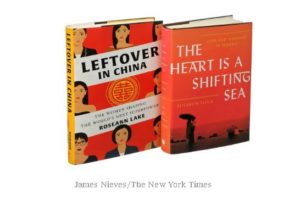By Parul Sehgal
Rarely has a newlywed delivered a more withering assessment of marriage than Charlotte Brontë. “It is a solemn and strange and perilous thing for a woman to become a wife,” she wrote to a friend — fresh off her honeymoon, no less.
A number of recent books have taken up her argument, looking anew at marriage and how it benefits women (or mostly doesn’t), as well as how our ideas about courtship and intimacy have evolved: “All the Single Ladies” by Rebecca Traister, “Labor of Love” by Moira Weigel, “Spinster” by Kate Bolick and “Future Sex” by Emily Witt, to name just a few. They’ve taken a skeptical and lively interest in the public pressures shaping our private bonds. In many cases, they puzzle over one question: Why is this institution, long regarded as desirable, even compulsory, falling out of favor around the world?
Inspired by a similar curiosity, two new books — “Leftover in China” and “The Heart Is a Shifting Sea” — look to China and India, respectively, to assess how marriage withstands breakneck economic growth, social change and the increasing financial independence of women. (Spoiler: badly.)
The books take opposite approaches. “Leftover in China,” the flimsier of the two, examines the phenomenon of sheng nu, or “leftover women” — highly educated, ambitious women who cannot find partners, or so the story goes. The author, Roseann Lake, a correspondent for The Economist, describes the dizzying rise of recent generations of Chinese women with a dizzying tempo of her own.
Lake zips through history. In 1949, 75 percent of Chinese women were illiterate. Today, China has one of the lowest rates of female illiteracy in the world — as well as the highest percentage of self-made female billionaires. She explains that the draconian one-child policy meant that families had to pour their resources into their only child, even if that child was a girl (and escaped sex-selective abortion, that is). Those daughters have grown into accomplished, tragically single women. They have so outpaced men professionally they can’t find suitable partners.
Is that it? Or is it that their ambition itself has rendered them undesirable? Or that dating is such a novel concept in China that men and women don’t know how to talk to each other? Lake entertains all these ideas in a confused fashion. What she doesn’t do is give sufficient space to Chinese women to explain their decisions and desires themselves. When that happens, in a fleeting scene halfway through the book, a more intriguing picture emerges. The female founder of a dating website tells her: “Most of these so-called leftover women have voluntarily chosen their lifestyle.” Lake scarcely grapples with the implication of this statement — how could she? It’s too at odds with her story, which has so firmly cast her subjects as victims and not agents.
In “The Heart Is a Shifting Sea,” Elizabeth Flock, a reporter for PBS NewsHour, offers a study as patient and careful as Lake’s is cursory. She followed three married couples in Mumbai for almost a decade: one couple is Marwari Hindu, another Muslim, a third Tamil Brahmin. In the mode of Katherine Boo and Adrian Nicole LeBlanc, Flock absents herself from the narrative, allowing us to enter the lives of her subjects and witness moments of almost unbearable intimacy.
Every agony of adulthood is presented with startling frankness — every miscarriage, every stupid investment, every sexual insecurity. The couples turned over their entire lives to the author; we can sift through their diary fragments, their text messages with their lovers, their bitter Gchats with their spouses. As a result, we learn everything about the couples, or so it seems: how they like to salt their food and part their hair, their pornography habits and preferences, their secret childhood traumas.
Aside from the voyeuristic pleasures (which are substantial), we get a sense of entering the consciousness of each character. So much of our personal lives can feel like desperate improvisation, but Flock reveals the scripts we consult — from novels, television, family lore and religion. The couples find coordinates for their stories and desires in Bollywood and James Bond films, Pakistani soap operas, the stories of Jeffrey Eugenides and Kamala Das. One woman defends her infidelity by telling herself that Radha, the god Krishna’s favorite consort, was a married woman. Another, in love with a man of a different religion, finds consolation in “The God of Small Things,” Arundhati Roy’s novel of an intercaste romance.
A small armada of books have explored the aspirations of India’s booming middle class, including the excellent “The Beautiful and the Damned” by Siddhartha Deb and “The End of Karma” by Somini Sengupta, a reporter at The Times. What distinguishes Flock’s take is her interest in and access to the inner lives of married women who face particular constraints: Divorce is difficult to obtain and highly stigmatized, and fathers are considered the natural guardians of any child over the age of five under the Hindu Minority and Guardianship Act.
Marriage is changing because women are changing — on this point, both “Leftover in China” and “The Heart Is a Shifting Sea” agree. We are, as Lake writes, meeting the protagonists of a new global narrative. Flock calls her subjects “romantics and rule breakers,” the women in particular. “They seemed impatient with the old middle-class morals. And where the established rules for love did not fit their lives, they made up new ones.” They also pay the price.
Follow Parul Sehgal on Twitter: @parul_sehgal.
Leftover in China: The Women Shaping the World’s Next Superpower
By Roseann Lake
271 pages. W. W. Norton & Company. $26.95.
The Heart Is a Shifting Sea: Love and Marriage in Mumbai
By Elizabeth Flock
358 pages. Harper/HarperCollins Publishers. $27.99.


